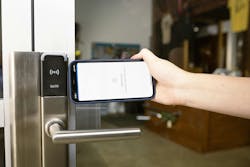Wireless Door Access for Retail: Keys-as-a-Service
By SALTO Systems
Most people have probably heard of software-as-a-service (SaaS) by now, but what about keys-as-a-service (KS)? This new technology is a game-changer for retail businesses.
KS is a cloud-based control system that allows users to manage access to any locked area door, exterior door, cabinet, locker — anything that requires monitored security. This has proven highly useful in retail establishments like restaurants, which can have multiple locations and tend to experience frequent changes in personnel. In these situations, traditional lock-and-key systems can not only be difficult and expensive to manage; issuing and retrieving keys can pose serious security issues.
How KS Works
KS wireless smart locks can be managed by any device with an internet connection, including a computer, tablet or phone. Because the locks can be monitored and controlled via the cloud, a single individual can manage multiple retail locations, tracking who goes where and when. When necessary, the manager can also lock and unlock doors remotely.
Digital keys can be programmed from anywhere in the world, enabling managers to quickly grant or deny access to users for one or more locations. Each user may receive a physical key fob that can be programmed from afar. Salto Systems’ waterproof key fobs, for example, do not need batteries and are instead powered by the door locks themselves. Users may also gain access through their phones, Android wearables, Apple watches and keycards.
If a particular user should no longer have access to any or all locks, that can also be remotely deactivated or reprogrammed by the manager at a moment’s notice. This prevents the need to recover physical keys — or having to rekey doors if that proves to be impossible.
“Wireless access control systems offer a variety of advantages in addition to security,” notes John Wright, Salto Systems Retail & Fitness Industry Business Leader. For example, there are definite financial benefits to KS implementation. Among these, Wright cites scalability, efficiency, ease of integration and reduced maintenance.
He explains, “I helped a well-known chain of restaurants implement a wireless control system to streamline delivery of wholesale food supplies. We gave their supplier partners the ability to gain controlled entry to the business in off-hours, which was a win-win for everyone.”
By enabling the restaurant to flexibly control deliveries for fresh ingredients at the most convenient and cost-effective times, “final mile” delivery costs — the last phase of the logistics process which can be the most difficult and expensive of all — were reduced. (Part of the extra cost of that last leg of the process is usually passed on to the restaurant.) This also allowed suppliers to make their deliveries without having to carefully coordinate with restaurant staff, saving everyone time and money.
Security was not an issue. Wright says, “Our system allowed the restaurant to generate mobile credentials for each supplier. These could be used during specified delivery windows, ensuring suppliers could access the restaurant’s storage facilities in off hours, while the restaurant’s management had a full audit trail of who entered the premises and when the delivery was completed.”
Ease of Use
While ideal for new retail construction, KS technology also can be easily implemented during renovation projects. The process of moving from traditional locks to keys-as-a-service in existing retail spaces is designed to minimize disruption to daily operations. Wright explains, “Switching to a Salto wireless access control system from traditional door locks involves an initial consultation, design, installation and a system setup, and then training.” For existing small- to medium-sized retail spaces, this entire transition can be completed in a just a few weeks.
That’s because Salto’s approach is designed to bypass the expensive and time-consuming infrastructure most access control systems require, he adds. The locks themselves can be installed on either interior or exterior doors and do not need servers, software installation or wiring to function because they are battery-operated and managed entirely in the cloud.
The company’s success stories extend to every sector of the retail industry, providing versatile solutions designed for all types of buildings and facilities, and securing virtually any conceivable door, opening or access point. “The flexibility and scalability of the system make it suitable for retail properties of all sizes, from a single store to a network of hundreds of global locations,” notes Wright.

